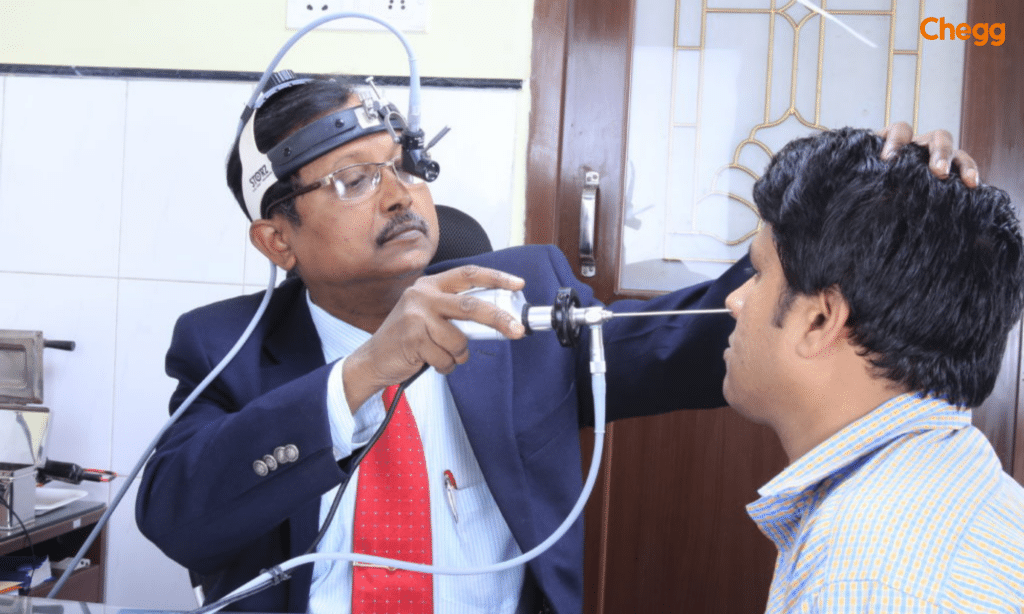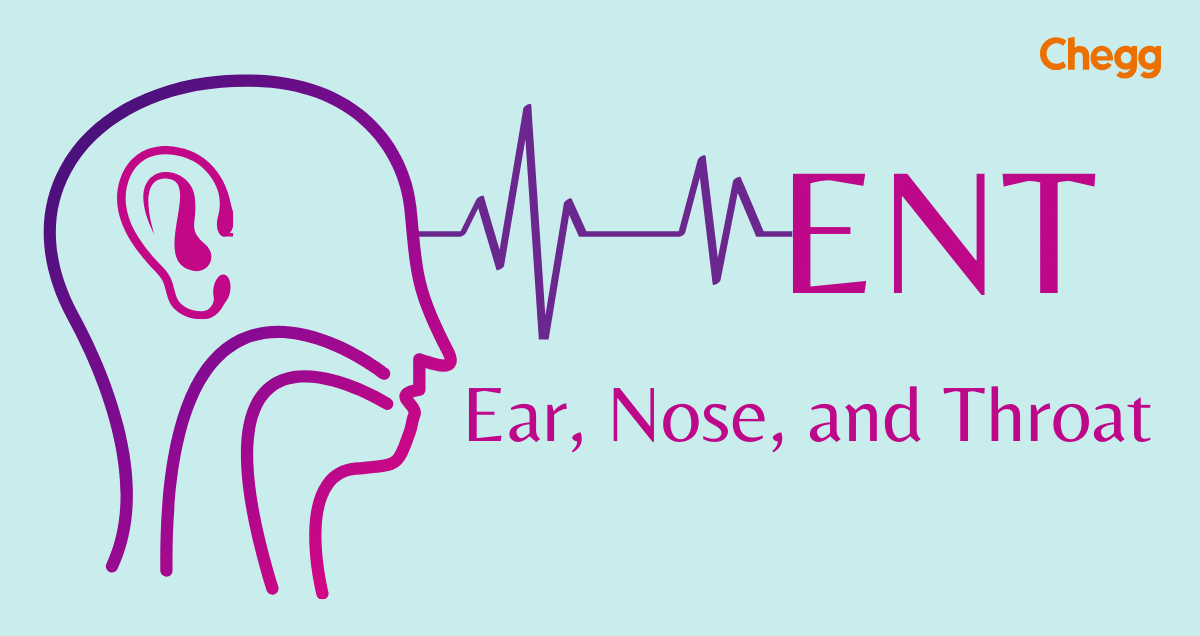Table of Contents
What is the full form of ENT?
ENT Full Form is Ear, Nose, and Throat. ENT (ear, nose, and throat) doctors specialize in treating problems with the ear, nose, throat, and related areas. They can help with issues like hearing loss, sinus problems, and throat conditions. They can also perform surgery on the head and neck.
ENT Meaning
Ear, Nose, and Thorat is the full form of ENT. An otolaryngologist specializes in the diagnosis, treatment, surgery, and management of ENT. He can treat the disorders related to the ear, nose, and throat.
Let’s explore each term in detail and consider how diseases or issues related to each sense organ impact the field of Ear, Nose, and Throat (full form of ENT).
Ear
Everyone commonly faces ear infections. With the advent of high-bass earphones, ear infections have also increased. It includes conditions like vertigo, ear infection, and hearing loss.
Nose
Nose infections take place due to cavities and allergies. Excess dust and pollution usually result in nose infections. It includes sinus, nasal fractures, runny nose, nose congestion, dust allergies, and rhinitis.
Throat
In throat infections, the throat gets infected and inflamed. This can be due to swallowing disorders, tonsils, or neurological problems.
Importance of Routine ENT Ear, Nose, and Throat Check-ups
It’s really important to get regular check-ups for your ears, nose, and throat. These check-ups can help find problems early, like infections, hearing loss, sinus issues, and even throat cancer. During these check-ups, doctors look closely at your ears, nose, and throat to check for infections, swelling, or anything unusual. They might also do tests to check your hearing and do other tests if they think something’s wrong.
By identifying potential problems at an early stage, routine ENT check-ups enhance the likelihood of successful treatment mitigate the risk of serious complications of successful treatment, and mitigate the risk of severe complications arising.
Various conditions treated by ENT specialist
- Hearing problems and ear conditions such as ear infections, dizziness, and tinnitus.
- Allergies like seasonal rhinitis and hay fever.
- Infections such as tonsillitis and sinusitis.
- Congenital or inherited abnormalities such as deviated septum, cleft palate, loss of smell, and drooping eyelids.
- Difficulty swallowing.
- Speech disorders like hoarseness and laryngitis.
- Tumors affecting the nose, throat, and ears, among other issues.
Do ENT Doctors Perform Throat Surgeries?
Ear Nose Throat is the full form of ENT. As ENT doctors are also surgeons in addition to diagnosticians, they can help with throat health through both medicine and surgery. Whatever the problem, they can help maintain good throat health and perform procedures on the ears, nose, and throat. From persistent tonsillitis to sleep apnea, the best ENT specialists are ready to help.
Specialties within ENT
There are various specialties within the field of Ear, Nose, and Thorat (ENT). You must have heard terms like otolaryngology, otology, rhinology, and laryngology. Let us discuss the different subspecialties within ENT:
Otolaryngology
Otolaryngology is a special branch of surgery and medicine. The doctors specialized in treating the ear, nose, and throat. People also know him as an Ear, Nose, and Throat (ENT full form) surgeon, ENT physician, or otolaryngologist.
Rhinology
Rhinology deals with diseases of the nose. He can diagnose and treat medical conditions related to the nose and sinuses. A rhinologist can treat problems like nasal obstruction, allergies, sinusitis, and nose infections.
Otology
Otology is the medical study of the ear. An otologist specialized in the diagnosis, treatment, and surgery of ear diseases. He can treat ear infections, hearing loss, tumors, and vertigo.
Laryngology
Learnology is a medicine that deals with larynx or voice box diseases. When someone has difficulties with their voice, sound, or swallowing, it’s usually because of problems with the larynx.
Approaches in Diagnosis and ENT Treatment
Do you know about the diagnostic procedures used by ENT specialists? If not, let us learn:
Physical examinations of ENT
Physical examination is the first step of a diagnostic procedure used by an Ear, Nose, and Thorat (ENT’s full form) specialist. The doctor can recognize abnormalities such as inflammation through a visual examination.

Imaging tests (CT scans, MRI)
Doctors use imaging tests to get a clear image of the inside structure of the ear, nose, and throat. Imaging tests include CT scans and MRIs. This test is used to confirm the presence of disease.
Audiometry and hearing tests
In an audiometry test, the patient is asked to recognize sounds of different frequencies. It helps in diagnosing hearing impairments. Once the tests are done, treatment takes place. Ear, Nose, and Thorat (ENT) specialists use various methods of treatment. Some of the common options in ENT treatment are the following:
ENT Medications
Patients are given antibiotics, steroids, antihistamines, and decongestants to treat their conditions.
Surgical interventions
Doctors opt for surgical interventions for conditions that medications and therapies cannot treat.
Rehabilitation therapies
Doctors use voice therapy, tinnitus retraining therapy, speech therapy, and immunotherapy to restore normal conditions in the body.
How to get admission to ENT courses?
To pursue courses in Ear, Nose, and Throat ( full form of ENT), follow these steps:
- Admission Tests: Apply for specialty courses in medicine through admission tests. Candidates must perform well in these entrance exams to secure admission. For MBBS programs, the NEET (National Eligibility Cum Entrance Test) is commonly used. NEET is a national exam conducted by the CBSE Council for enrolling students in MBBS and BDS courses across the country.
- Graduate Medical Admissions Tests: Some graduate medical admissions tests are administered nationally and statewide. Here are some medical entrance tests for admission to MD/MS courses:
- JIPMER
- AIIMS
- JIPMER PG
- NEET PG
- AIIMS PG
- Top Institutions in India for ENT Courses:
- Jawaharlal Institute of Postgraduate Medical Education and Research (JIPMER) in Puducherry
- Postgraduate Institute of Medical Education and Research (PGIMER) in Chandigarh
- Maulana Azad Medical College (MAMC) in New Delhi
- Kasturba Medical College (KMC) in Mangalore
- All India Institute of Medical Science (AIIMS) in New Delhi
- Madras Medical College (MMC) in Chennai
Remember to check the specific admission requirements and eligibility criteria for each institution.

ENT Specialist: Jobs
- Assistant to an otolaryngologist (ENT)
- A surgeon specializing in otoplasty (Ear, Nose, and Throat Surgeon)
- Consultants
- Individual specialist
- Teacher
- Researcher
Summing Up
ENT Full Form stands for Ear, Nose, and Throat. An ENT specialist can diagnose and treat your conditions. Depending on your needs, you can see an otolaryngologist, rhinologist, otologist, or laryngologist. While it’s helpful to learn about ENT infections to recognize symptoms, always seek expert guidance from a medical professional. They provide diagnosis, treatment, surgery, medications, therapy, and management of your condition. Using physical tests and imaging like otoscopy, rhinoscopy, audiometry, and nasal endoscopy, they can pinpoint the root cause of your illness.
More Full Form: https://www.cheggindia.com/full-forms/
Learn about some other full forms:
| RBC Full Form | WBC Full Form |
| NICU Full Form | SGOT Full Form |
| ORS Full Form | SGPT Full Form |
| CHO Full Form | OPD Full Form |
ENT Full Form : FAQs
What is ENT’s full form?
The full form of ENT in the medicine is Ear, Nose, and Throat.
What are the options for ENT treatment?
Doctors use various treatment methods. This includes medications, surgery, hearing aids, voice therapy, balloon sinuplasty, endoscopy, allergy shots, cochlear implants, and lifestyle changes.
How to avoid ear infections?
To avoid ear infections, you should keep the ears dry. Do not put any foreign object in your ear. Also, reduce the usage of earphones.
Name the most common ENT conditions.
The most common ENT conditions are tonsillitis, ear infections, sinusitis, and allergies.
What are the popular diagnostic procedures?
Some common diagnostic procedures are otoscopy, audiometry, imaging test, physical test, tympanometry, nasal endoscopy, laryngoscopy, allergy testing, and rhinoscopy.
What is an ENT specialist?
An ENT specialist, alternatively referred to as an otolaryngologist, is a physician specializing in diagnosing and treating disorders related to the ear, nose, and throat.
What is ENT OPD full form?
ENT OPD stands for Ear, Nose, and Throat Outpatient Department.
Can ENT check eyes?
No, ENT specialists typically do not check eyes as part of their practice; this is usually done by ophthalmologists.
Got a question on this topic?
